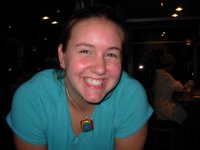“You get a strange feeling when you’re about to leave a place…you’ll not only miss the people you love but you’ll miss the person you are now at this time and this place, because you’ll never be this way ever again.” -
Reading Lolita in TehranThe way I am here is a collage of old Laura demeanor and new Mauritanian behaviors. I pondered the things I do and the way I am now that I will never do or be again…
-I feel triumphant when following radio theatre story lines. (And I listen to radio theatre in the first place!)
-I am outside about 100% of the time. I am indoors only to change clothes. Eating, sleeping, bathing, working, socializing all takes place in the shade of trees, under the moon or in the scorching sun.
-My ears perk at new verbs and useful adjectives, and my Pulaar dictionary is crumbling from infinite references.
-I often have a vague sense that I have done or said something culturally incorrect or inappropriate. The underlying doubt that I am fully understanding life is omnipresent.
-I have an intense awareness of the physical world. The moon’s phases, hours of the sun rise/set, wind direction, temperatures and the likelihood of rain. Never again will I have to notice, let alone care about such things.
-I deal with a restricting inability to pre schedule meetings or work days more than a day in advance. I am constantly engaged in a toggling of programs- shifting pre-planned events around weddings, funerals and “personal” business that is public in a village that does not differentiate the two.
-“Site guilt” pangs that unexpectedly hit after one too many days in Kaedi. This is a common PCV occurrence after idle days away from host families and integration opportunities. Our consciences tug us back to our true purpose of being in Mauritania- live with Mauritanians.
-Silent slow hours for writing, reading and self-reflection
-I buy impossibly small amounts of products. Ten cents of sugar, three bananas for a buck, a gulp of juice for a penny.
-I treat the internet like a rare tryst into paradise. I stay up all night scorching my eyes dry, overwhelmed by all the information, entertainment and endless e-mails.






